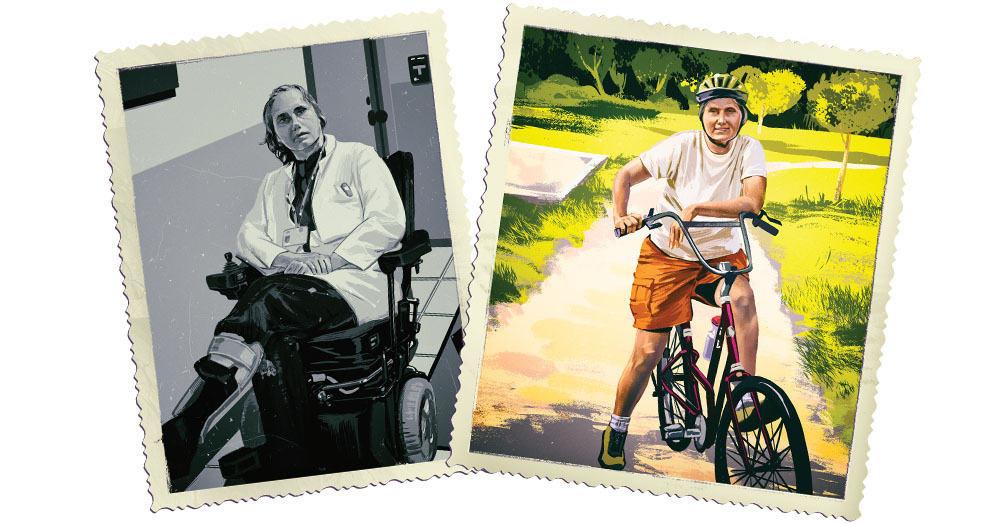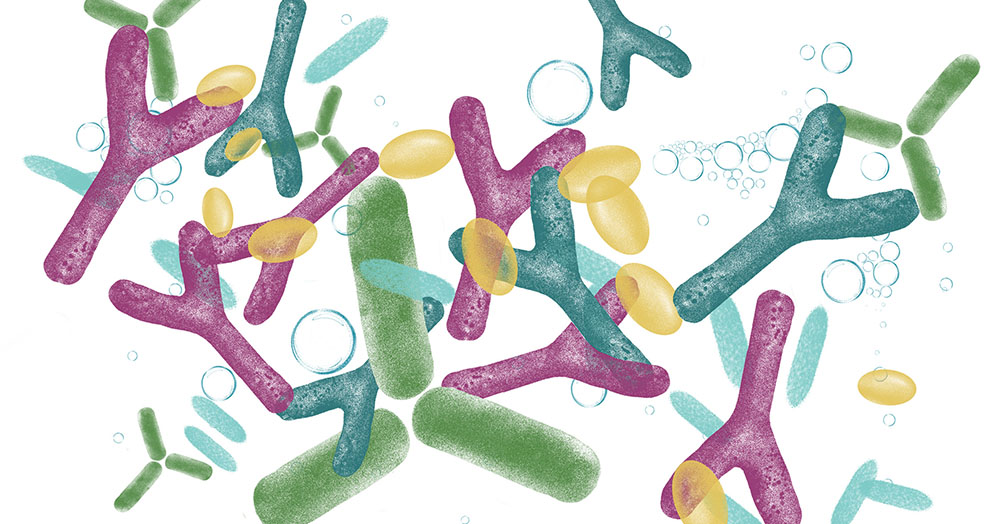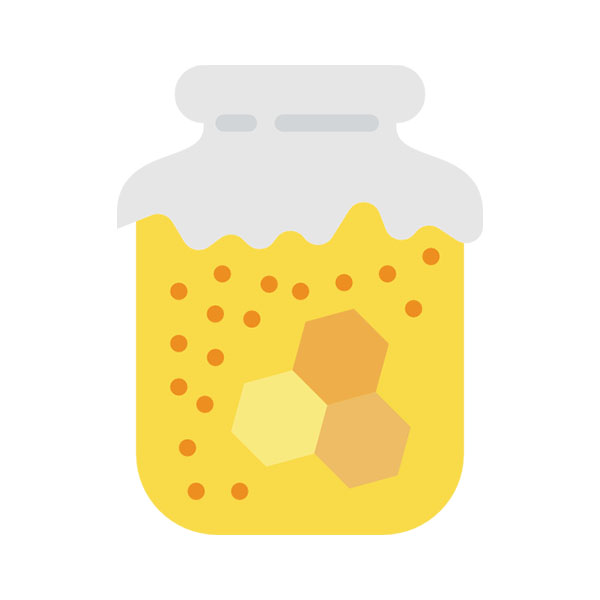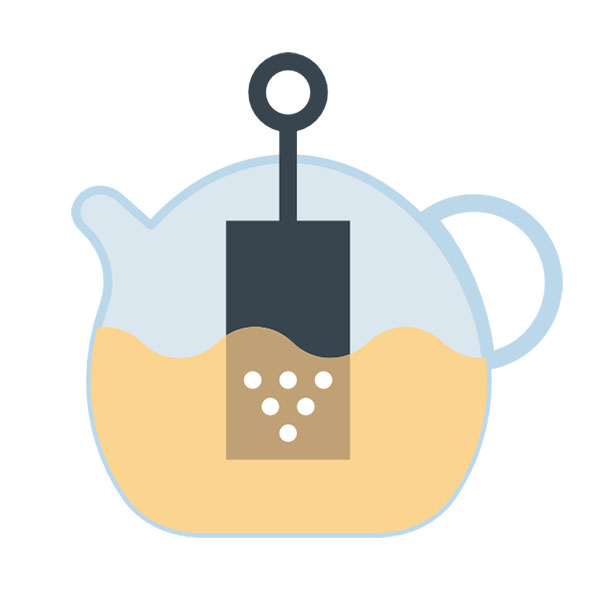Iowa’s Terry Wahls Shares Secrets to Growing a Healthy Gut Garden
 Images By W.Flemming Illustration
University of Iowa researchers, including Terry Wahls, reveal the importance of our gut microbiome to health and disease.
Images By W.Flemming Illustration
University of Iowa researchers, including Terry Wahls, reveal the importance of our gut microbiome to health and disease.
When University of Iowa researcher Terry Wahls works in her backyard garden, her thoughts often return to the farm where she grew up in northeast Iowa. Her family’s 220 acres in Clayton County included a sprawling vegetable plot, where Wahls loved to plant and pick asparagus, peas, and green beans alongside her mother.
What Wahls didn’t know then was that the plant-rich diet, and working in the soil itself, helped her cultivate another garden—the microbiome in her gut. Today, as an internationally known physician, author, and speaker, Wahls (82MD, 86R) evangelizes the importance of gut health as she makes new discoveries about the effects of diet and lifestyle on chronic disease. She’s among the many Iowa researchers investigating the microbiome—the tiny ecosystem of bacteria, fungi, viruses, and genes that naturally live in our body—and its impact on our health.
“The food we eat is fertilizer for our microbial garden,” says Wahls, a clinical professor of internal medicine. “If you eat more fruits and vegetables, you’re fertilizing health-promoting bacteria. But if I’m inhibiting those helpful microbes by having lots of sugar, lots of white flour, lots of food-like chemicals, then I may be fertilizing new bacterial species that are creating compounds that interfere with the chemistry of life.”
A flourishing gut microbiome is essential for good health. This native garden in our mouth and digestive system is populated by trillions of microscopic organisms first inherited from our mothers through the birth canal and breastfeeding. Our diets and environment introduce new microbes to our biome—which is unique to each person—while other exposures can harm gut microbiota. When this diverse ecosystem prospers, we too thrive thanks to the symbiotic benefits provided by these organisms. Gut bacteria help us break down certain foods, synthesize micronutrients, fight pathogens, and control inflammation. It can also assist neurotransmitters and help regulate aspects of our metabolism.
On the flip side, “all disease begins in the gut,” as Hippocrates supposedly said more than 2,000 years ago. An unhealthy gut microbiome, known as dysbiosis, can directly lead to infections and conditions like inflammatory bowel disease. Gut problems have been tied to a host of other issues, including allergies, asthma, anxiety and depression, obesity, certain cancers, and neurodegenerative diseases.
For Wahls, the “gut garden” analogy is a useful one for discussing the microbiome with her hundreds of thousands of followers on Instagram and Facebook. One day this past spring, while digging in her backyard in Iowa City, she filmed a social media clip as she extolled the benefits of gardening without gloves. Helpful bacteria in the soil can be passed to our own microbiome, explains Wahls, including microbiota that influence neurotransmitters tied to mood like serotonin and dopamine.
Gardening, in other words, helps nurture your gut garden.
“Play in the dirt,” she tells her followers in the video. “It’s good for you.”
 Terry Wahls used a tilt-recline wheelchair in 2007. A year later, she was back on a bicycle.
Terry Wahls used a tilt-recline wheelchair in 2007. A year later, she was back on a bicycle.
Food as Medicine
The most powerful driver of our gut microbiome is our diet—and Wahls’ personal health journey is, famously, a testament to that crucial connection. In 2000, Wahls was diagnosed with multiple sclerosis, an autoimmune disease that occurs when our immune system goes awry and mistakenly attacks the brain and spinal cord. MS affects nearly 1 million people in the U.S. and over 2.8 million worldwide.
By 2003, Wahls had begun chemotherapy and was using a tilt-recline wheelchair, unable to sit upright because of muscle weakness. But even as her body declined in the coming years, she continued to search for answers. Wahls dove into the latest scientific studies and zeroed in on the growing evidence of how nutrient-rich foods boost brain and mitochondrial health. She devised a program of diet and lifestyle interventions—later dubbed the Wahls Protocol—that featured a modified Paleolithic diet to support her microbiome. Wahls’ dietary regimen emphasizes green leafy vegetables, fermented vegetables like sauerkraut, colorful fruits, and meat and fish packed with protein and good fats. At the same time, her protocol limits grains, legumes, dairy products, sugar, and processed foods.
When Wahls combined her dietary overhaul with physical therapy, electrical muscle stimulation, and other functional medicine concepts, the results were dramatic. In less than a year, her debilitating fatigue faded, she regained her strength, and she began walking—and even cycling—again. At the urging of former UI Carver College of Medicine Dean Paul Rothman, Wahls and colleagues published a 2009 case study of her success with functional medicine and the paleo diet. She launched her first clinical trials at Iowa in 2010, and she shared her story in a TEDx Talk in 2011 that went viral and has been watched millions of times. In 2014, she published The Wahls Protocol, which serves as a roadmap for people suffering from the ravages of MS and other autoimmune conditions. A decade later, the book has sold more than 400,000 copies, and Wahls is a sought-after speaker and podcast guest. She regularly receives emails and letters from people around the world who have benefited from her protocol and follow-up book, Cooking for Life.
“If you want to fix how your cells do the chemistry of life, we need to also improve our nutrition.” —Terry Wahls
At the same time, Wahls and her UI laboratory team remain committed to advancing research in MS and other diseases. Currently, in one of the largest and longest dietary intervention studies ever for MS patients and funded by a $2.5 million grant from the Carter Chapman Shreve Family Foundation, Wahls’ group compares the effects of different diets on fatigue and quality of life for people with the disease. In a separate study, the Wahls lab is evaluating the efficacy of an online wellness course emphasizing diet for people with MS, fibromyalgia, long COVID, and cancer patients in remission who have significant fatigue.
The goal, says Wahls, is not to replace drug therapies, but to help patients struggling with chronic health conditions make lifestyle changes that can improve their pain and fatigue—the two most common complaints she hears in her clinical work. Her interventions aim to work in tandem with traditional care, not as a cure-all.
Wahls has found in her clinical practice that, by teaching patients how to improve their nutrition through diagnostic testing and personalized recommendations, 80% to 90% report a noticeable reduction in fatigue and improved energy within three months.
“Drugs that have FDA approval to treat a specific condition and block a specific biochemical pathway can be very helpful, so this is not an either-or,” Wahls says. “If you want to fix how your cells do the chemistry of life, we need to also improve our nutrition.”

Inner Allies
Wahls isn’t the only Iowa researcher deeply interested in “our microbial friends,” as she calls them. Among her campus collaborators is Ashutosh Mangalam, a scientist who serves as an associate professor of pathology and directs the Microbiome Core at UI Health Care Holden Comprehensive Cancer Center. Mangalam has spent nearly two decades investigating the connection between the microbiome and the immune system. That line of inquiry began at the Mayo Clinic, where he helped identify a key type of bacteria called Prevotella, which can suppress inflammation and is associated with diets high in fiber.
Mangalam explains that over the course of human evolution, our bodies have outsourced many essential functions to the gut microbiome. For example, scientists have discovered that about 90% of the body’s serotonin is produced in the gut before entering the bloodstream. Mangalam compares this evolutionary shift to the development of the automobile: Just as cars have gained new features to boost performance—from power steering to self-driving systems—our microbiome has evolved new bacterial features that enhance biological efficiency. “This bacteria said, ‘Pick me as a tenant because I’ll produce a metabolite, so your body doesn’t have to work as hard,’” Mangalam says.
The symbiotic relationship between certain gut bacteria and the human body is highlighted in a newly published study in the journal PNAS by Mangalam and his UI team examining the microbiome of patients with multiple sclerosis. The researchers analyzed the chemical and bacterial makeup of the gut in people with MS and confirmed they had signs of gut inflammation and a distinct bacterial profile compared to individuals without the disease. Through studies in mice and samples from MS patients in Iowa and internationally, the team found that an imbalance between two key bacterial groups—“one good bacteria, and one good bacteria gone bad,” as Mangalam describes it—may not only signal disease, but could also help predict its severity.
”A healthy lifestyle means healthy bacteria.“ —ASHUTOSH MANGALAM
While Mangalam’s work in the lab studying this hidden ecosystem is complex, he offers a simple takeaway: “A healthy lifestyle means healthy bacteria.” That means eating an abundance of greens, eliminating stressors to the best of our ability, and getting regular exercise. Mangalam says that science has just begun to scratch the surface of the power of the microbiome. His lab is currently exploring the therapeutic efficacy of human gut-derived bacteria as a drug—a therapy he’s dubbed “Brug”—in animal models of MS.
“Don’t be surprised when you go to a doctor in the future, and they do your checkup and blood work and say, ‘Oh, you need this bacteria, because these are the metabolites that are lacking,’” says Mangalam. “They’ll say, ‘Take this bacteria, and you’ll be good to go.’”
UI nutrition expert Linda Snetselaar (75MS, 83PhD), a professor of epidemiology in the College of Public Health, says the microbiome plays a vital role in the emerging area of “precision nutrition”—tailoring diets to people’s different circumstances and biological characteristics. In recent years, the National Institutes of Health launched a massive study to develop artificial intelligence algorithms to predict the ideal diets for individuals based on their genetics, biology, behavior, and other factors.
“The microbiome will be a really important piece to individualizing a dietary pattern and helps us be much more precise in how we make our recommendations,” says Snetselaar, who served on the USDA’s 2020-25 Dietary Guidelines Advisory Committee. “I think that’s something we’ll see in the future.”
A person’s gut microbiome is ever-changing, says Snetselaar, and its composition can vary significantly from person to person. Currently, she’s working on a study with colleagues in the College of Public Health comparing the microbiomes of pregnant women to nonpregnant women. She’s also a member of Wahls’ research team conducting the five-year study among MS patients following three dietary protocols: a modified Paleolithic diet, a ketogenic diet, and a control diet following the USDA’s dietary guidelines. Meanwhile, Snetselaar serves on a national committee that works with researchers studying the mechanisms of the gut-brain connection and how diet and the microbiome may be linked to neurological disorders like dementia.
To support a healthy microbiome, and good health generally, Snetselaar recommends “cooking with colors of the rainbow.” That means devoting at least half of your plate each meal to colorful and nutrient-packed fruits and vegetables while minimizing added sugars and saturated fats. “We’re trying to really maximize those fruits and vegetables that tend to give us the highest level of nutrients, which is connected to less disease and lower mortality rates,” Snetselaar says.

Bearing Fruit
Wahls turns 70 later this year, and she’s as active as ever. Beyond her work to promote nutrition and wellness programming and conducting her research, she cycles, swims, and doesn’t miss a Hawkeye women’s basketball game. Last year, she became a grandmother, which prompted her to add strength training to her fitness regimen so she can carry her grandson even as he grows.
It’s a life that was almost unimaginable 20 years ago, when Wahls seemed destined to spend her remaining days bedridden with devastating pain and worsening brain fog. That’s why, after her dramatic recovery, she says she felt “morally obligated” to spread the word about the power of diet and lifestyle—and advance research about how nutrition is related to MS and other progressive health problems.
Wahls’ hope is that one day, patients diagnosed with MS will be advised from the start to improve their diet, better manage their stress, and exercise regularly.
When Wahls first began sharing her story, some in the medical community expressed skepticism, and the National MS Society banned her as a speaker over apprehensions that she was spreading false hope. But things have changed. Over the past decade and a half, her team has conducted seven clinical trials, published dozens of papers related to diet and MS, and has been cited over 1,700 times by other scientists. Wahls’ hope is that one day, patients diagnosed with MS and other autoimmune and chronic health problems with neurological or psychological symptoms will be advised from the start to improve their diet, better manage their stress, and exercise regularly.
“I tell my postdocs and biomedical students that it’s a 30-year journey,” says Wahls. “I’m 15 years into this, and my ideas are no longer crazy. So, in another 15 years, it will be the standard of care that, yes, physicians will still recommend FDA-approved drugs, but they will also stress the importance of improving diet and other modifiable lifestyle factors like sleep, stress, and exercise to have more vitality and health.”
Wahls’ short-term ambitions, meanwhile, are closer to home. Recently, she planted blackberry bushes alongside the raised-bed gardens and fruit trees in her backyard. Rich with antioxidants, fiber, and vitamins, blackberries have been shown to feed friendly bacteria in our microbiome—making them a much-anticipated addition to Wahls’ kitchen.
If all goes to plan, the first crop of berries will be ready to pick next year. Her grandson will be just old enough to help.





